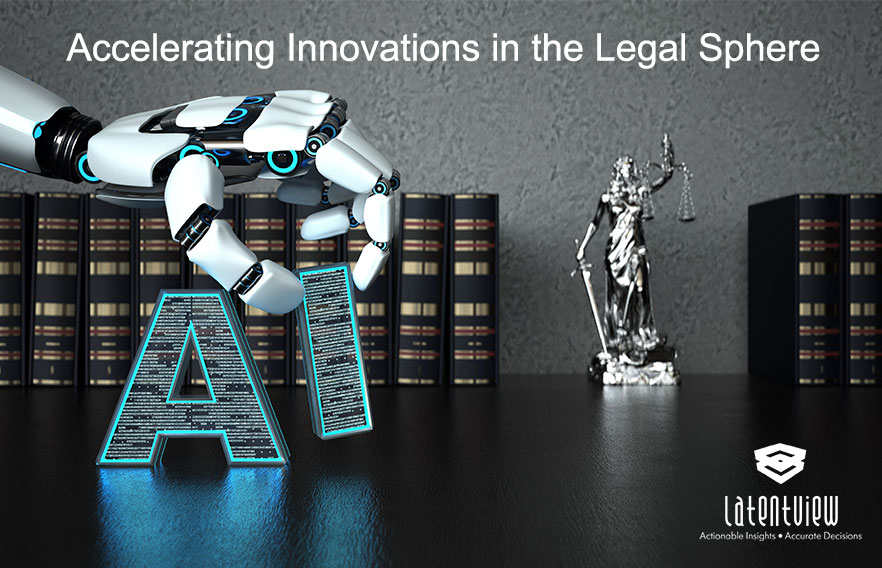A techno-legal bridge between the operation of lawyers and technology is prima facie evidence in the current legal system. Laws govern business, economic, and other activities in furtherance of the growth and development of a nation and an individual. At the same time, technology has always worked towards making life on earth easier and civilized. But the implications and use of technology or Artificial Intelligence (AI) in law is a rare instance to witness in the legal industry.
Before we elaborate on the benefits of AI in the legal landscape, let us understand the meaning and essence of Artificial Intelligence. In general parlance, AI is a wide-ranging branch of computer science concerned with building smart machines capable of performing tasks that typically require human intelligence. Advancements in AI is creating a paradigm shift in virtually every sector of the industry. The use of Artificial Intelligence in the legal system is under progress already and is destined for even greater adoption and acceptability.
Artificial Intelligence in the Legal Industry
Artificial Intelligence can categorically reform the outlook and working of the legal sector with its cognitive capabilities and effective assistance. A rare yet efficacious combination of AI and law will witness immense growth in the future of the legal system. Listed below are certain areas in which artificial intelligence is proving to be yielding proficient results:
Due Diligence: Contract drafting/Contract reviewing is one of the essential tasks performed by law firms and lawyers to cater to the needs of different businesses, companies, individuals, and society. Therefore, to review a contract, there is a need to conduct diligent legal research and more accurate contract review by searching, highlighting, and extracting relevant content for analysis, which can further be reviewed multiple times. Thus, Artificial Intelligence software can prove to reduce human efforts and ease this tedious task of lawyers.
As per this article, COIN ( Contract Intelligence), an initiative started by JPMorgan in June 2016, extracts 150 attributes from 12,000 commercial credit agreements and contracts in only a few seconds. This is equivalent to 36,000 hours of legal work by its lawyers and loan officers according to the company.
Prediction Technology: AI software can prove to be prediction-oriented as well. It can predict the probable outcome of the cases negotiated between parties /adjudicated before the Court of Law. A handful of legal authorities are using machine learning models to predict the outcomes of pending cases, using the corpus of relevant precedent and a case’s particular fact pattern as inputs. For instance, Toronto-based Blue J Legal is a startup developing an AI-powered legal prediction engine, with an initial focus on tax law. According to the company, its AI can predict case outcomes with 90% accuracy.
Legal Analytics/ Research: Since time immemorial, legal research has been a manual and time taking process. Law students, juniors, and associates manually go through the physical volumes of law journals to search relevant case laws. In recent decades, with the advent of technology, this process has gone digital and lawyers now conduct research using computer programs like SCC Online, Manupatra, Lawsuit, CaseMine, and Westlaw. Yet these established solutions do not possess much intelligence and merely act as a basic search engine.
Automation of Documentation: It is a well-known fact that legal proceedings involve voluminous documents. It is one of the biggest challenges faced by law firms and lawyers in arranging, managing, and preserving the documents of assorted clients while maintaining the confidentiality of the same. Artificial Intelligence has again stood the test of efficiency due to intelligent arrangement and categorization of the relevant documents. For instance, the evolving Robotic Process Automation (RPA) and optical character recognition (OCR) can be used for the management of bulky documents without changing their structure thereby reducing the back-office costs.
Intellectual Property: The application of AI helps in the administration of Intellectual Property (IP) and in providing insights into the IP portfolios. For instance, WIPO Translate and WIPO Brand Image Search leverages AI-based applications for automated translation and image recognition.
The automatic classification of patents and goods and services for trademark applications are other promising areas for the application of AI. According to WIPO Magazine in May 2018, WIPO launched an automatic patent classification tool IPCCAT- neural for the International Patent Classification (IPC) system using neural network technology. This new tool will be retrained annually with updated patent information and will help patent examiners access and search “prior art” more easily. This, of course, is an important basis for establishing the patentability of an invention.
Electronic Billing: In recent decades, AI tools have helped lawyers and law firms in preparing invoices. Such technology provides for accurate and transparent billing for the work done by a lawyer. Thus, Artificial Intelligence has proved to be beneficial not only for lawyers but for clients as well.
Creation of Data Pool: AI may best be applied by lawyers and law firms to create a pool of their data based on their practice areas in the field of law. For any industry or business, data is useless unless it is used to make decisions and provide insights. Thus, AI can help lawyers, law firms, and in-house legal teams to make these natural connections and use their data to perform their work.
Challenges Faced by AI
The application of Artificial Intelligence has manifested substantial results in every industry. In the legal system, there are certain doubts regarding its reliability, particularly when it comes to confidentiality and ethical considerations.
Another reason for the non-acceptance of Artificial intelligence by lawyers and law firms is the budget constraints and cost involved in employing AI. The Indian legal system is the combination of in-house counsels, tier-1 law firms, mid-size tier firms, and lawyers working individually. Thus, it becomes difficult for lawyers and mid and small size law firms to adopt efficient but exorbitant artificial intelligence tools.
Conclusion
Artificial Intelligence is bound to transform the practice of law in drastic ways. At present, the implication of AI in law is only limited to Microsoft Word, email, and search engines. Considering the size and needs of the legal market, this furnishes a significant opportunity for using AI tools and software. These solutions can help lawyers in saving their time, energy and efforts, and work more efficiently.
Thus, the acceptance of Artificial Intelligence will unlock massive opportunities to transform and revitalize the legal system.



